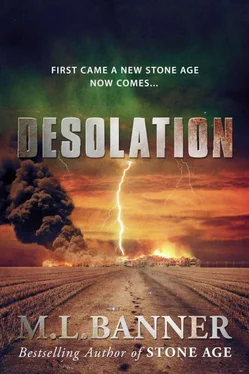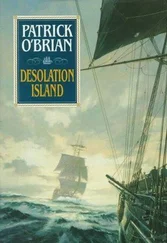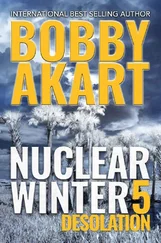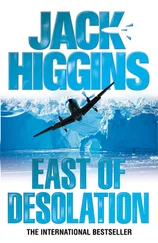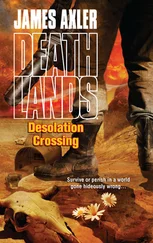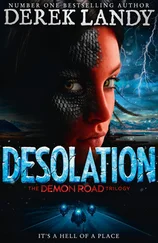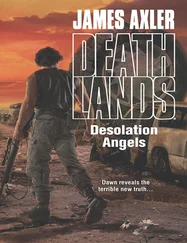She attempted to say something and then drifted off. “Great! And how the hell am I supposed to carry you when I can’t even carry myself right now?”
With a harrumph , he grabbed her arms and dragged her to his tricycle. His trike was meant to carry only one person, but he was not going to leave her to die. So, he propped her up and into his seat, where she remained mostly unmoving, her only sign of life her shallow breaths. He slid into the seat from behind her, lifting her onto his lap, supporting her dead weight. Blindly finding the pedals, he inched forward with the last few ounces of energy he had.
They moved slowly down Lincoln Highway and then directly into the city center on Grand Avenue. By all measures, it was an idyllic little western town, especially on this street: a postcard of what the typical Old West towns should look like. It was probably their last hope, because he was on empty.
He passed over some railroad tracks and the crown of a bridge, when he noticed a purposeful grouping of vehicles forming a barricade in the road. He continued forward, hoping there was a way around it. A single gunshot cracked the silence, the bullet striking the asphalt a few feet away from him. Digging into his brakes, he came to a stop almost instantly. If it wasn’t a warning, he and his new friend’s lives were finished.
“State your business,” a high-pitched, screechy voice called out from behind a Chevy Tahoe.
Scratchy wisps of breath were all that would come out of his mouth. He tried once more. “I’m… Dr. Carr-ing-ton… Reid. I’m really si-”
“Carrington Reid? As in the Dr. Carrington Reid?” a jubilant voice asked from behind the several vehicles blocking their way.
“Yes… I am… Dr. Reid.” His words were feeble and hard to hear above the wind washing over this bridge.
“Well I’ll be damned,” came another voice out of group-led murmurs. “Let the man who probably single-handedly saved our town through the gates,” said a deep male voice with a very pronounced Texas drawl.
One of the cars, a little blue Ford Fiesta, rolled just behind the bulk of a late model Chevy Tahoe. It continued its silent march, without the sound of an engine, until it revealed seven or eight people. All had rifles, but all held in a nonthreatening manner. Before allowing himself to pass out he watched a man who wore a giant white Stetson walk through the opening, holding his hand up in the universal sign of “hello.”
~~~
His eyes flickered open. Blinking several times, he attempted to orient himself with the gray 1970s popcorn ceiling above.
“Welcome back, Dr. Reid,” said the man wearing the big white Stetson.
He wondered if it was the same day or much later, trying to remember the light outside when he passed out. Then he thought of the woman. He attempted to say something, but nothing came out. His throat felt like coarse sandpaper. “Where is the girl?” The words rubbing the back of his throat came out in harsh whispers.
“Oh, Melanie? She’s a purdy one, your wife is. She’s fully recovered since ya brought her in three days ago. We were worried about you, Dr. Reid. You were one sorry-lookin’ son-a-beach when you ended up on our doorstep. Ya’d a fever of one-hundred-four, but our doc shot ya full of antibiotics and yer fever broke yesterday. We’ve been tryin to let ya sleep. But that filly, she’s been check’n on ya all the time.”
“My wife?” Carrington asked, puzzled but feeling better by the minute. “Where is she?”
“She’s working on the wall detail. Don’t get mad, she was dying to help. Ya’ll see her shortly, I’m sure. How ya feelin’, Doc?” The way he said “help” sounded like “hail” with a P on the end.
Carrington pushed himself out of bed, onto his feet. He felt pretty good, although a little weak. He smiled his answer.
After introductions, Bartholomew T. Witherstream, who offered to be called Tex—this was of course a lot easier to remember since it matched his drawl—gave him the grand tour of the town. It turned out Tex had been a subscriber to Carrington’s CMERI Bulletins, and he’d prepped the whole town. Four days before the Event, Tex had worked with the town’s police and council to start their contingency plan. When Carrington sent out his last Bulletin, the day before the Event, Laramie carried out Tex’s plan. They sealed up the historic downtown area and literally cut the electrical lines leading to the town’s center, along with many of those leading to buildings. That let them escape the fires when the first CME hit. They also collected food and water and now had storehouses of both. Since then, they had been shoring up their defenses, awaiting an attack they were sure would come any day now.
“Everybody’s got their duties an’ so far they’s all worked t’gether,” Tex went on, continuing the tour. “Y’see, becuz most of the buildin’s are brick an’ we disconnected off the grid, we were able t’avoid th’ fires.”
“What about outside of the downtown?” Dr. Reid asked.
“Well so far, they haven’t been a problem, but we expect that to change shortly when the food runs out,” chimed in Sheriff Ralf Peterman.
“Raff takes his s’curity serious as a heart-attack,” Tex added. “Tell Dr. Reid whatchu done.”
“Besides the walls, we’ve set up scouts who watch all four points of the perimeter for any incoming threat,” Peterman continued. “That’s how we knew you were coming.”
“So, what do you have as far as weapons go?” Carrington asked, sitting on a chair in front of the sheriff’s station, a few blocks from where the tour started.
“Nothing major, Doc,” said the sheriff, “mostly hunting rifles, a few Winchesters and a couple of assault rifles from the local store. Most everyone here has a handgun. But that’s it.”
“Yep, we didn’t plan that one too good, did we, Doc?” said Tex plaintively.
“Show me the railroad yard, ’cause I have a couple of ideas on that,” Carrington said as he stood.
“Sure, Doc,” said Tex, pausing briefly. “Hey, thar’s your wife, comin’ towards us right now.” Rat naow.
All their heads turned to a group of three people walking their way.
Carrington recognized instantly the woman they called his wife, even though he had been widowed for four years now. It was the woman he’d found on the side of the road. She had short cropped hair, a confident smile, and although a little dirty from work, and still a little puffy in one cheek, she looked beautiful.
“Hi, honey. So glad to see you’re up.” Melanie leaned over and kissed him on the lips, and then hugged him. “I’m Melanie, I’ll explain later,” she whispered in his ear, away from the others.
Carrington felt more light-headed than he realized. “Ahh, hi” was all he could think to say.
“Come with us Melanie, if y’ain’t too tired. I was jus’ ’bout ta show the doc our railroad. He says he has an idear about defense.” Tex ushered them forward.
“Why not, Tex, I would love to.” Melanie took Carrington’s arm and they walked together, following Tex as they whispered their stories to each other.
“I know not with what weapons World War III will be fought, but World War IV will be fought with sticks and stones.”
~ Albert Einstein
“Albert got it wrong—World War IV will be fought and won by those who found all the leftover guns.”
~ Maxwell J. Thompson
Rocky Point, Mexico
Bill King found himself alone on their pool deck, a wide-brimmed straw hat shading his face, staring blankly into his own abyss. The bright sunlight didn’t bother him as much as this morning’s dark realization. It was almost certain Lisa and he would never see their youngest children, Danny and Darla, ever again. He leaned over the front of one of their two Adirondack chairs, his only support after a bout of tears. The sea winds, thick with humidity and ruination, anxiously grabbed at his muddled-gray hair, yanked at his Hawaiian shirt and partially clean shorts, and threatened to topple him with little effort. Struggling to even lift his head and see the new realities of this world around him, he realized this was no longer a place of solace.
Читать дальше
